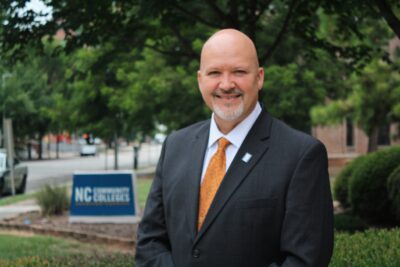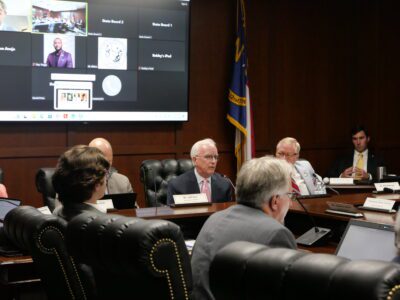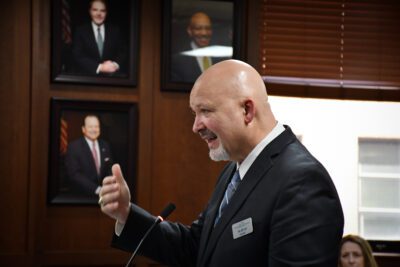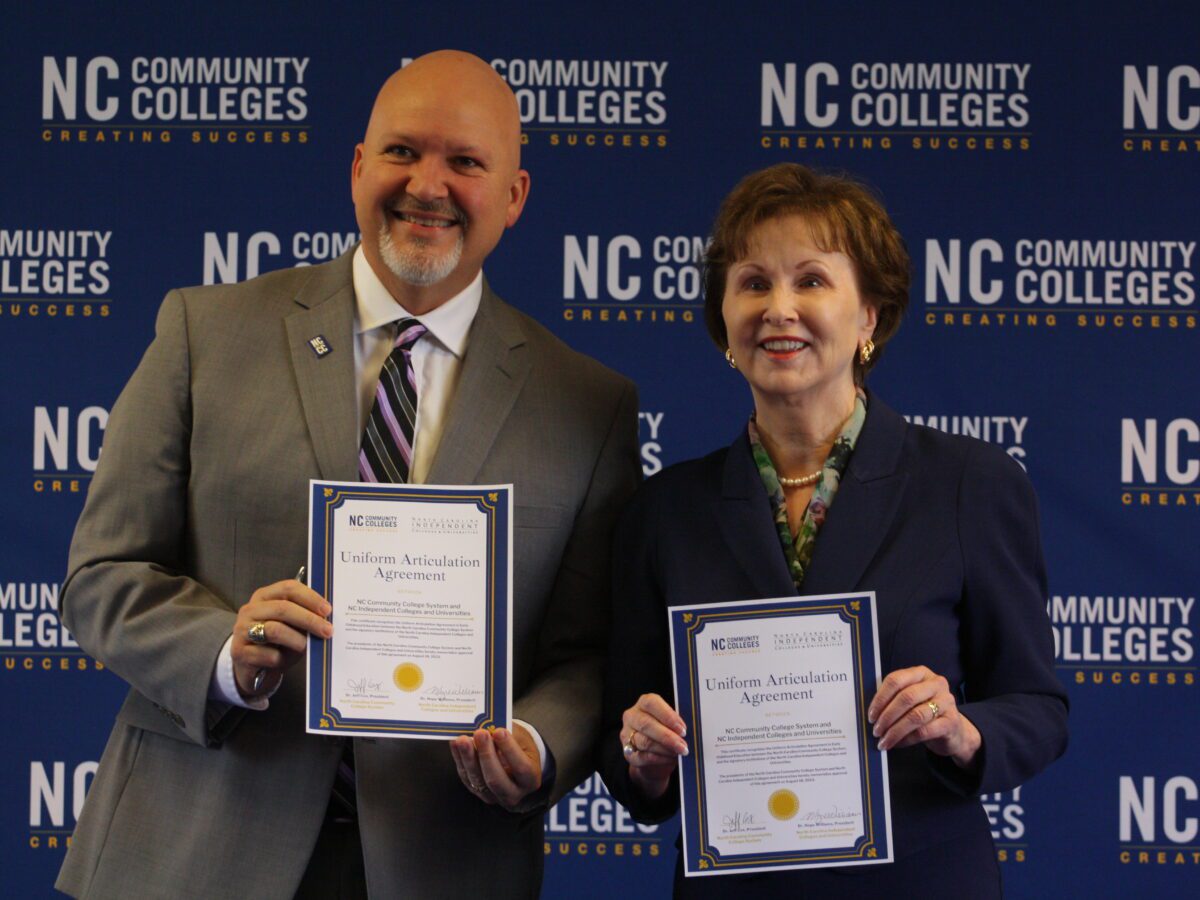
Share this story
- The State Board of Community Colleges approved an articulation agreement in early childhood education between the N.C. Community College System and N.C. Independent Colleges and Universities – part of work to streamline pathways and meet workforce needs.
- The State Board’s meeting last week included several important updates across the system, including a new early childhood education agreement, new college presidents, an update on rural broadband efforts, and more.
|
|
The State Board of Community Colleges approved on Friday a new uniform articulation agreement in early childhood education between the North Carolina Community College System (NCCCS) and North Carolina Independent Colleges and Universities (NCICU) – another step in the system’s efforts to streamline student pathways and meet workforce demands.
An articulation agreement outlines a clear transfer plan between two program offerings to help prevent students from taking credits at one college that are not recognized by the school they wish to transfer to. The agreement, created jointly by the two systems, was officially signed by NCCCS President Dr. Jeff Cox and NCICU President Dr. Hope Williams after the Board’s meeting.
Both systems hope the agreement will lead to an increase in the number of four-year degree teachers with a Birth-Kindergarten license in North Carolina, according to the articulation document, along with a more diverse and educated early childhood workforce and increased economic mobility for the teachers.
“We are so excited about this partnership – we know that especially pre-K and early childhood is critical,” Williams said. “We all know how much children learn when they’re that young, and we need to have great teachers for them. So we’re excited about this opportunity.”
As EdNC has previously reported, the early care and education system is in crisis. On one hand, a lack of affordable child care contributes to worker shortages. On the other, low wages for teachers leads to less capacity while also threatening the quality of early childhood programs.
Cox acknowledged this reality during the signing ceremony. He mentioned the system’s focus on economic mobility and the Board’s recent work to identify programs that have a strong economic impact for students.
“What we know sometimes is with early childhood, with our associate degree students, they don’t always have the best economic return. So having the flexibility to go on and get this four-year degree gives students in that field the capacity to go on to jobs that do pay a living wage,” he said. “This is a critical agreement, and we’re pleased to be here to sign with you today.”
Williams added that NCICU’s partnership with the system is far reaching. The two institutions first signed a comprehensive articulation agreement in the mid-1990’s, which was revised in 2015.
This new articulation agreement is specifically focused on community college students getting an associate in applied science in early childhood degree. It joins the other specific agreements between the systems, including RN/BSN, music, theater, fine arts, sociology, and psychology.
“We’re so excited to have that because it really makes sure that students don’t lose credits by making sure they know exactly what to take,” Williams said.
NCICU is also looking to increase individual agreements between NCICU and NCCCS institutions, Williams said, and streamline its financial aid policy and advising.
“We’re really looking beyond the way that we can make this more streamlined, certainly more welcoming and friendly, and help the students get to the finish line,” she said. “So this is another step in that direction. We’re excited to be able to work together.”
Read the full articulation agreement document.
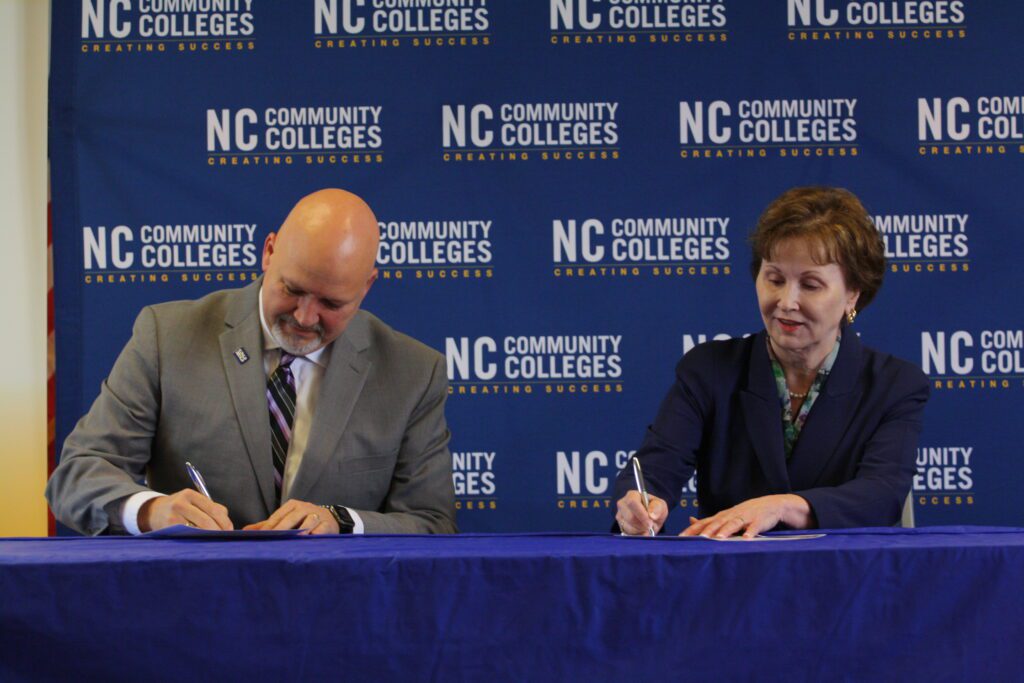
New college presidents, system goals, and more
The State Board’s meeting on Aug. 18 was the first full meeting under the leadership of the new chair, Tom Looney, and vice-chair, Dr. Grant Campbell, both unanimously elected in July.
“We’re no longer going to be the Great 58,” Looney said at the time. “We’re going to be the Extraordinary 58.”
The Board introduced several new college presidents: Randolph Community College President Dr. Shah Ardalan, Sandhills Community College President Dr. Alexander “Sandy” Stewart, and Wilson Community College President Dr. Jami Woods.
The Board also approved Ryan Garrison as the interim president at McDowell Technical Community College. The current president, Dr. Brian Merritt, was selected as the system’s new chief academic officer last month. He will start on Sept. 1.
Three other colleges are searching for a new president, according to the system’s college president status report.
“Our presidents are the heart and soul of our colleges,” Looney said. “So thank you all for the work you’ve done.”
At the system office, the staff vacancy rate is around 10%, according to the report presented at the Board meeting. Last August, that rate was just over 13%.
Cox, who started as system president on June 1, said his team is working hard to fill remaining positions. Looney praised the system office’s work, adding that it is the shortest vacancy report he’s seen since he joined the Board.
The Board also heard updates on its strategic planning work and new presidential goals.
Staff presented a proposed dashboard to track the system’s progress toward the goals outlined in its strategic plan. The system is still working toward a launch date of the dashboard, along with where to launch it. You can view the proposed dashboard on the system website.
The Board also discussed possible evaluation metrics for Cox regarding his first-year goals, approved last month. Those metrics will come back to the Board to be approved in September.
Members of the Board discussed at length Cox’s goal to “develop an updated viable funding model.” There was particular interest in weaving in legislative relationships and requests into that work.
“We’ve got a lot of supporters out there of our community college system, so we are going to keep moving forward to build and strengthen those relationships,” Cox told the Board during his report.
Finally, the Board spent about 30 minutes in closed session on Friday discussing “system shared governance.” The Board did not provide any details of the discussion when it came back into open session.
Career coaches and CCP
The Board approved its annual report to the General Assembly on the N.C. Career Coach Program, “which places community college Career Coaches in high schools to assist students with determining career goals and identifying educational pathways enabling students to achieve these goals.”
The program was started in 2015. Members of the programs and student success committee emphasized the need to expand the program.
During the 2022-23 academic year, there were 100 career coaches at 46 community colleges, the report says, serving more than 30,000 students across 64 school districts.
By July 1, however, there were only 83 career coaches across the state.
“While the Career Coach Program has grown and demonstrated success, barriers to on-going success continue,” the report says. “These barriers consist of the difficulty of consistent PowerSchool access for data collection, staff turnover and the data collection tool.”
Students in the program enrolled in a variety of high school Career & Technical Education (CTE) pathways and community college Career and College Promise (CCP) CTE pathways, according to the report.
On Thursday, the Board discussed the impact of such dual enrollment programs during its “transformative discussion” – previously known as the issues luncheon.
The presentation, “The Impact of High School Dual Enrollment on Student Success in North Carolina,” was given by Dr. Julie Edmunds, director of Early College Research at UNC Greensboro’s SERVE Center, and Dr. Emily Smail, director of research and evaluation at NCCCS.
The presentation explored results from a five-year study, funded by the U.S. Department of Education’s Institute of Education Sciences, meant to examine the impact, implementation, and cost of the Career and College Promise (CCP) program.
CCP includes three pathways: CTE, college transfer, and Cooperative Innovative High Schools (CIHS). The study did not compare the programs, stating that each has different goals.
Some key findings from the presentation include:
- Participation in CCP led to a significant difference in college credits earned, compared with students not participating in CCP.
- Participation in CCP also led to an increase in credentials earned. However, for CTE students, participation in CCP meant they were less likely to earn a bachelor’s degree than non-CCP students (24.1% vs. 26.6%.)
- Rural schools have a higher participation rate than urban schools.
- Schools with higher percentages of minority students have lower CCP participation rates, in both urban and rural regions.
The Board briefly discussed barriers to CCP for students and how to expand access. Members expressed wanting to continue the discussion in the future.
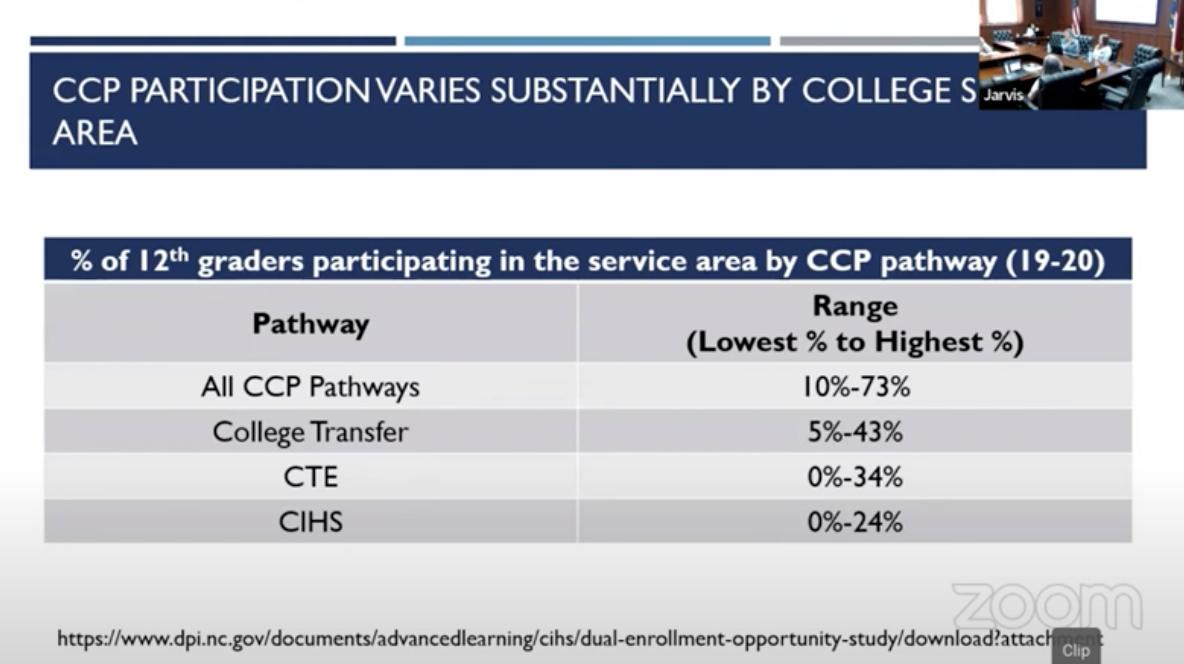
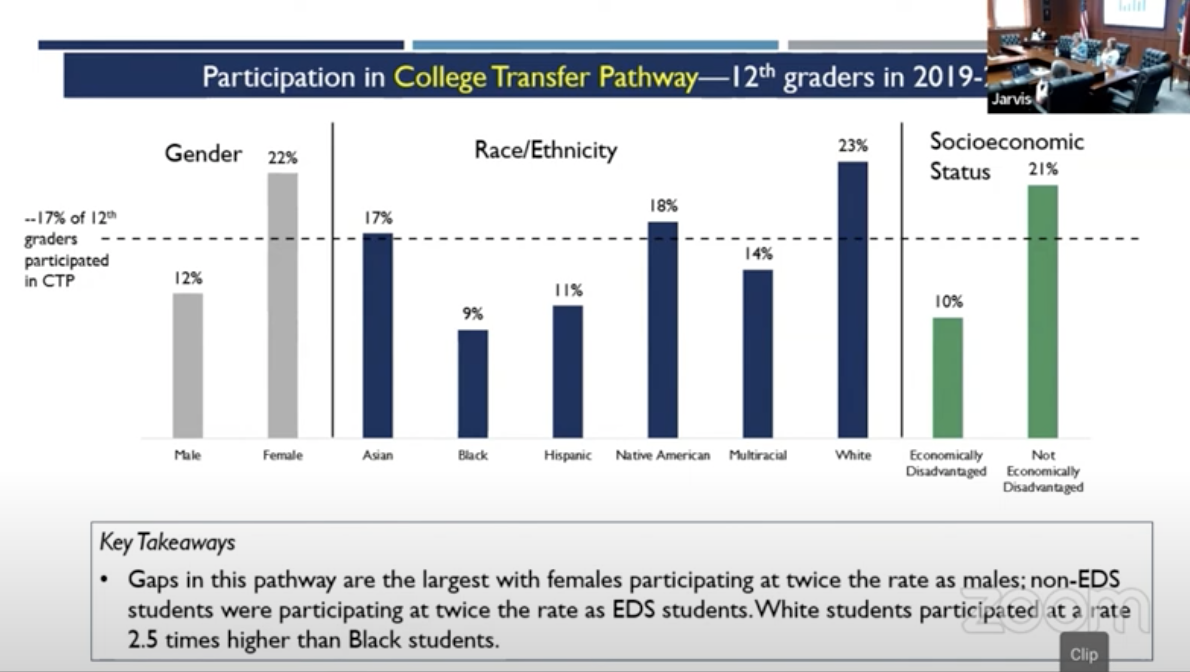
Rural broadband and ERP
The Board received an update on the system’s technology modernization efforts, including rural college broadband access and Enterprise Resource Planning (ERP) systems.
In January 2022, the State Board approved an allocation of up to $14.25 million from federal State Fiscal Recovery Funds to fund IT infrastructure and network security improvements at 25 colleges in rural and economically challenged regions.
In March, the State Board approved an additional $750,000 – making a $15 million total investment to the 25 participating colleges. Last month, the system completed allocations to those colleges, included below.
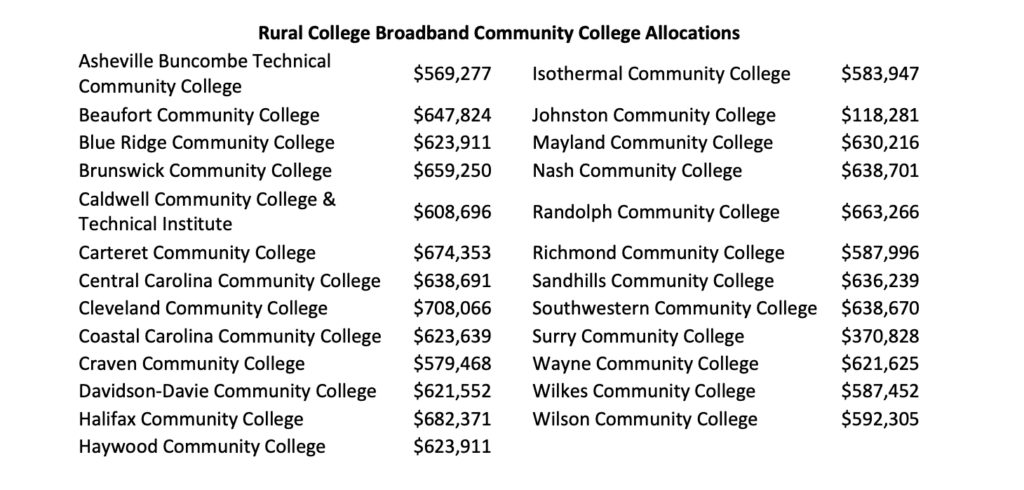
The system is also implementing a five-phased approach to modernize ERP systems for the state’s 58 community colleges and system office. An ERP system refers to the software colleges use which contains data on students, core financial management, grants, human resources, and payroll, among other things.
The NCCCS is now on phase four of its modernization plan, which includes modernizing and upgrading core services at the system office and partnering with five community colleges to prepare local ERP systems to transition to Ellucian Banner SaaS.
Those five colleges are: Caldwell Community College and Technical Institute, Fayetteville Technical Community College, Forsyth Technical Community College, Rowan-Cabarrus Community College, and Surry Community College.
“This work is not going to be easy, but the payout will be unbelievable when we can transition off of a 20-year-old ERP system,” said Patrick Fleming, NCCCS senior vice president and chief information officer. “We can no longer sustain 58 individual ERP systems if we’re going to become ‘the Extraordinary 58.’ We just can’t operate that way.”
Other meeting items
The Board approved the allocation of $1 million in state funds to continue the short-term workforce development grant program.
The program will provide financial assistance of up to $750 per course for “resident students who enroll in noncredit, short-term workforce training programs that lead to an industry-recognized credential in fields with employer demand and competitive wages,” the agenda document says.
The finance committee discussed the State Board Reserve Report for FY 2022-23, which showed nearly $330,300 in unexpended state funds. About $175,000 of those funds was returned to the state on June 29, per the report.
The following unexpended balances were returned, according to the report:
- $62,960 to provide Diversity, Equity, and Inclusion training for System Office staff and board members and to develop a System Office Action plan around equity.
- $76,600.81 for “Curriculum Alignment in Critical Industries” at Central Carolina Community College, along with another unidentified college, with a focus on meeting workforce demand.
- $30,240.52 to expand existing SNAP Employment and Training programs at the System Office.
There was also an uptick in audit findings among colleges, according to the Summary of Compliance Reviews Conducted Fiscal Year 2022-2023. Out of 33 colleges that had compliance reviews in 2022-23, 16 came back with findings – compared to five colleges in 2021-22 and six in 2020-21. Fourteen of the 16 findings this year were listed as minimal.
Board members said they would continue to investigate both matters, but suggested staff turnover and capacity problems were contributing to both cases.
Finally, per the meeting agenda, there are currently two expiring terms and one vacancy for membership of the State Board.
The Board meets next for its annual retreat Sept. 13-15 at Wayne Community College in Goldsboro.





